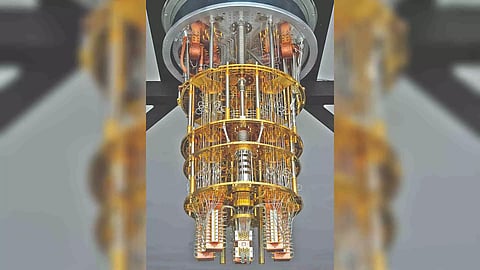

Quantum computers today are small in computational scope — the chip inside your smartphone contains billions of transistors while the most powerful quantum computer contains a few hundred of the quantum equivalent of a transistor. They are also unreliable. If you run the same calculation over and over, they will most likely churn out different answers each time.
But with their intrinsic ability to consider many possibilities at once, quantum computers do not have to be very large to tackle certain prickly problems of computation, and on Wednesday, IBM researchers announced that they had devised a method to manage the unreliability in a way that would lead to reliable, useful answers. “What IBM showed here is really an amazingly important step in that direction of making progress towards serious quantum algorithmic design,” said Dorit Aharonov, a professor of computer science at the Hebrew University of Jerusalem who was not involved with the research. While researchers at Google in 2019 claimed that they had achieved “quantum supremacy” — a task performed much more quickly on a quantum computer than a conventional one — IBM’s researchers say they have achieved something new and more useful, albeit more modestly named.
“We’re entering this phase of quantum computing that I call utility,” said Jay Gambetta, a vice president of IBM Quantum. “The era of utility.” A team of IBM scientists who work for Dr. Gambetta described their results in a paper published on Wednesday in the journal Nature. Present-day computers are called digital, or classical, because they deal with bits of information that are either 1 or 0, on or off. A quantum computer performs calculations on quantum bits, or qubits, that capture a more complex state of information. Just as a thought experiment by the physicist Erwin Schrödinger postulated that a cat could be in a quantum state that is both dead and alive, a qubit can be both 1 and 0 simultaneously.
That allows quantum computers to make many calculations in one pass, while digital ones have to perform each calculation separately. By speeding up computation, quantum computers could potentially solve big, complex problems in fields like chemistry and materials science that are out of reach today. Quantum computers could also have a darker side by threatening privacy through algorithms that break the protections used for passwords and encrypted communications. When Google researchers made their supremacy claim in 2019, they said their quantum computer performed a calculation in 3 minutes 20 seconds that would take about 10,000 years on a state-of-the-art conventional supercomputer.
But some other researchers, including those at IBM, discounted the claim, saying the problem was contrived. “Google’s experiment, as impressive it was, and it was really impressive, is doing something which is not interesting for any applications,” said Dr. Aharonov, who also works as the chief scientific officer of Qedma, a quantum computing company. The Google computation also turned out to be less impressive than it first appeared. A team of Chinese researchers was able to perform the same calculation on a non-quantum supercomputer in just over five minutes, far quicker than the 10,000 years the Google team had estimated.
Chang is a science reporter with NYT©2023
The New York Times